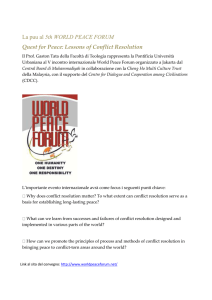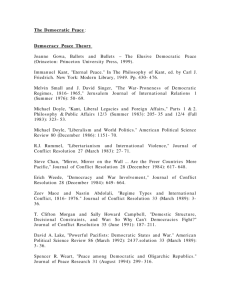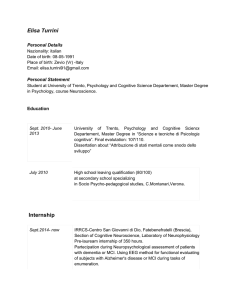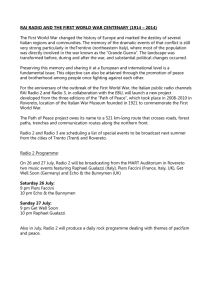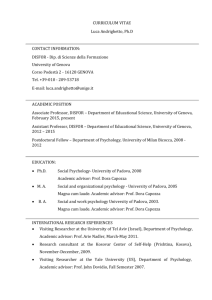IB.Academic Context - Society for the Study of Peace, Conflict
advertisement
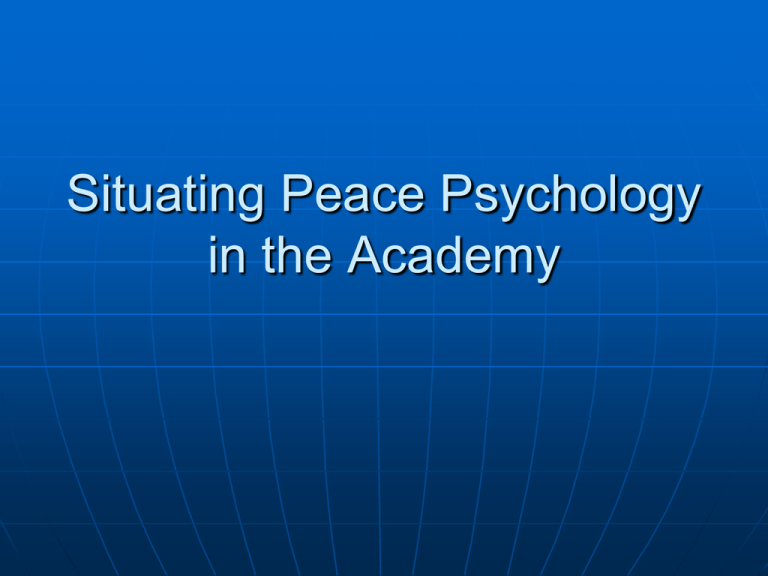
Situating Peace Psychology in the Academy Post-Cold War Peace Psychology 1. More global in scope 2. Nuanced by geohistorical contexts 3. More differentiated: Distinguishes episodes of violence & structural violence 4. More systemic organized (Christie, JSI, 2006) Peace Psychology: Global Scope •Australia •Germany •Ireland •Italy •Japan •Malaysia •Philippines •South Africa •Sweden •Venezuela •UK •USA Example of Geohistorical Context: Malaysia Differentiated & Systemically Organized Episodic Violence Episodic Violence Peacebuilding Episodic Peacebuilding Structural Systemic Violence Structural Violence Systemic Peacebuilding Structural Peacebuilding (Christie, JSI, 2006) Post-cold War Peace Psychology: More Differentiated, Contextualized, & Systemic TABLE OF CONTENTS Volume 62 Issue 1 , Pages 1 - 208 (March 2006) INTRODUCTION AND OVERVIEW What is Peace Psychology the Psychology of? (p 1-17) Daniel J. Christie SYSTEMIC VIOLENCE The Psycho-Ecology of Armed Conflict (p 19-40) Deborah Du Nann Winter, Mario M. Cava Toward a Psychosocial Theory of Military and Economic Violence in the Era of Globalization (p 41-62) Marc Pilisuk, Joanne Zazzi Bullying in Schools: A Plea for Measure of Human Rights (p 63-79) Michael B. Greene Reconciliation between Aboriginal and Other Australians: The "Stolen Generations" (p 81-98) Di Bretherton, David Mellor Post-cold War Peace Psychology: More Differentiated, Contextualized, & Systemic SYSTEMIC PEACEBUILDING Intergroup Contact, Forgiveness, and Experience of "The Troubles" in Northern Ireland (p 99-120) Miles Hewstone, Ed Cairns, Alberto Voci, Juergen Hamberger, Ulrike Niens Psychosocial Assistance for Youth: Toward Reconstruction for Peace in Angola (p 121-139) Michael Wessells, Carlinda Monteiro Peacebuilding as a Gendered Process (p 141-153) Cheryl de la Rey, Susan McKay Terrorism: A Peace Psychological Analysis (p 155-171) Richard V. Wagner Political Psychology of Nonviolent Democratic Transitions in Southeast Asia (p 173-190) Cristina Jayme Montiel CONCLUSIONS Realistic Empathy and Active Nonviolence Confront Political Reality (p 191208) Milton Schwebel Social Psychological Peace Research (SPPR) (Vollhardt & Bilali, SP, 2008) SPPR refers to the overlapping conceptual domains of peace and social psychology Peace Psychology Social Psychology Social Psychological Peace Research (SPPR) Study 1: Conceptual, using indexes of social and peace psychology handbooks. Study 2: Quantitative: based on content analysis of journals in social and peace psychology (Vollhardt & Bilali, SP, 2008) Study 1: Conceptual Relations Between Social Psychology and Peace Psychology Based on indexes in three handbooks: 1. Handbook of Social Psychology (Gilbert et al., 1998) 2. Peace, Conflict, and Violence: Peace Psychology for the 21st Century (Christie, Wagner, & Winter, 2001) 3. War and Peace: Handbook of Conflict and Peace Psychology (Sommer & Fuchs, 2004) (Vollhardt & Bilali, SP, 2008) Conceptual Domain of Peace Psychology Deals with “the preventionof structural violence and intergroup conflict as well as the promotion of positive intergroup relations (p. 15 & 16).“ In addition, prototypical peace psychology research meets the following criteria: 1. 2. 3. 4. Normative (vs. value-neutral) research Contextualized (vs. context-free) research Multiple levels of analysis (vs. methodological individualism or holism) Practical (vs. epistemic) research orientation (Vollhardt & Bilali, SP, 2008) Figure 1. Conceptual relations between social psychology and the (social) psychological study of peace. Note. Area A includes social psychological concepts that are at the core of SPPR. Area B those that are directly relevant, and Area C concepts indirectly relevant to SPPR. (Vollhardt & Bilali, SP, 2008) Social Psychological Peace Research: Core Concepts Authoritarian personality Conflict resolution Contact hypothesis Dehumanization Discrimination Escalation dynamics Ethnocentrism Graduated and Reciprocated Initiatives in Tension Reduction Intergroup relations Multiculturalism Racism Realistic group conflict theory Relative deprivation Right-wing authoritarianism Social dominance orientation Social equality Social change Social justice Tolerance (Vollhardt & Bilali, SP, 2008) Social Psychology with Direct Relevance to Peace Psychology Research Aggression Altruistic behavior Belief in a just world Bystander intervention Conflict Conflict escalation Cooperation Cross-categorization Deindividuation Empathy Frustration-aggression hypothesis Gender stereotypes Group polarization Group think Ideology Ingroup bias Intergroup contact Justice motive Moral outrage Morality Negotiation Obedience Power Prejudice Prosocial behavior Self-categorization theory Social categorization Social identity (theory) Social movements Solidarity Stereotyping Violence (Vollhardt & Bilali, SP, 2008) Social Psychology with Indirect Relevance to Peace Psychology ResearchSelf-determination Attitudes Attribution Cognitive bias Cognitive dissonance Expectancy value models Fundmantal attribution error Group dynamics Group pressure Learning theories Identity Integrative complexity Machiavellianism Majority/minority influence Moral dilemma Naïve realism Needs Perceptual/observer bias Perspective taking Political participation Rational choice theories Self-concept Self-efficacy Self-esteem Self-fulfillinng prophecy Self-perception Self-presentation Self-regulation Social categories Social cognition Social comparison theory Social dilemmas Social influence Social motives Social perception Social support Social value orientation Theory o f planned behavior Trust Value orientation /systems (Vollhardt & Bilali, SP, 2008) Study 2 Content Analysis: SPPR (Core Concepts) Represented in High Impact Journals SPPR Criteria: • Relevant: addresses the prevention of structural violence or intergroup conflict or the promotion of positive intergroup relations; • At least three of four criteria were met (normative, contextualized, multilevel, and practical); • Used social psychological constructs or theories. (Vollhardt & Bilali, SP, 2008) Social Psychological Peace Research in Leading Journals (2001-2005) (Vollhardt & Bilali, SP, Social Psychological Peace Research in Leading Journals (2001-2005) (Vollhardt & Bilali, SP, Social Psychological Peace Research in Leading Journals (2001-2005) (Vollhardt & Bilali, SP, Peace Psychology & Academic Fields International Peace & Relations Conflict Studies Conflict Resolution Discipline Social Sciences Transdisciplinary Multidisciplinary Unit of Analysis State and Interstate Multiple Multiple Time Frame 1648 to date Large: Past & Future Present Oriented Values Epistemic & Neutral Normative & Value Explicit Normative & Value Explicit Goals Descriptive & Explanatory Policy Oriented Resolving Conflicts Negative Peace Negative & Positive Peace Negative Peace Subject Differentiated & Systemically Organized Episodic Violence Episodic Violence Peacebuilding Episodic Peacebuilding Structural Systemic Violence Structural Violence Systemic Peacebuilding Structural Peacebuilding (Christie, JSI, 2006)
